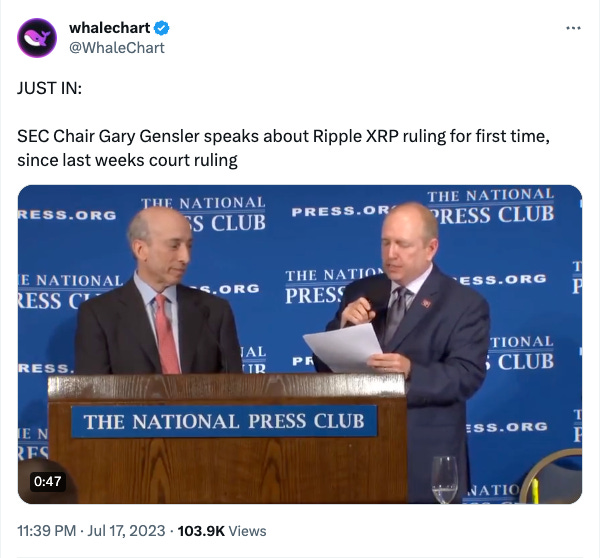All that Ripple 🌈
The unfolding drama around XRP. Where will Ripple end up? Melania's NFT trouble. Uniswap founder suffers Twitter breach. Canadians' crypto stolen from their homes. FTX wants to sue Sam Bankman-Fried.
Hello, y'all. Are you're planning to watch either Barbie 🤗 Oppenheimer?
You want to pocket what Asset has got for you » Barbenheimer «
A free collectible. 20 seconds is all it takes 👇 own it now 🙌
This is The Token Dispatch, you can hit us on telegram 🤟 Don't forget to give your books a »» Muzify «« spin?
The US House Financial Services Committee hit the brakes on voting for stablecoin and crypto trading legislation.
The showdown is now set for July 26.
Here's what's causing all the commotion
⚖️ Democrats and industry advocates believe the current securities laws are enough to handle cryptocurrencies. They're not so keen on new regulations that could stifle the industry.
⚖️ On the other side, Republicans, led by Reps. French Hill and Patrick McHenry, want new laws to regulate digital assets. They're eyeing the Commodity Futures Trading Commission (CFTC) as the go-to regulator.
The recent SEC vs. Ripple Labs case could be a game-changer. A federal judge ruled that XRP sales to institutional investors were securities violations, but everyday investors got a pass.
The ruling ruffled some feathers, and Republicans smell an opportunity to rally their stablecoin bill.
However, Democrats are standing firm behind SEC Chair Gary Gensler, who believes most crypto activities fall under the SEC's watchful eye.
Reminding the context: 2020 saw the SEC calling out Ripple, claiming they were flipping unregistered XRP securities to investors, singing a $1.3 billion lawsuit tune. But last week, the court dropped a mixed beat: programmatic sales of XRP to retail investors were not securities, but $728 million worth of contracts for institutional sales were considered unregistered securities. XRP went all the way up.
The victory might be short-lived?
According to former SEC official John Reed Stark, the current judgment favouring XRP is on "shaky ground," and the SEC is ready to appeal, possibly leading to a reversal.
📝 Here's what you need to know
The ruling in question means that XRP is sometimes considered a security and other times not. But remember, this ruling only applies to this specific court and doesn't set a precedent for other cases.
The court might certify an immediate appeal to the Second Circuit, comparing it to similar SEC cases like the one against Telegram.
The Ripple decision creates a new category of quasi-securities, suggesting that retail investors are less savvy than institutional investors.
Additionally, the ruling implies that when tokens are sold to an exchange instead of directly to sophisticated investors, they stop being securities. This assumption is based on the idea that retail investors may not fully understand what they're buying.
Ripple attorney optimistic
Ripple's general counsel, Stu Alderoty, believes that the recent legal ruling is a positive sign for Ripple, and they are betting on attracting big clients, especially US banks, to use their services again.
"I think we're hopeful that this decision would give financial institution customers or potential customers comfort to at least come in and start having the conversation about what problems they are experiencing in their business, real-world problems in terms of moving value across borders without incurring obscene fees."
Ripple has been expanding its reach beyond the US. For instance, Colombia's government is exploring the use of Ripple's XRP Ledger for enhancing transparency in land ownership.
Gensler speaks out
During a talk on artificial intelligence, Gary Gensler was asked about the ruling's impact on cryptocurrency regulation. He said the SEC is pleased with the decision to protect institutional investors but still assessing its impact on retail investors.
Gensler was then grilled about whether the ruling could set a precedent, but he kept mum on the topic, citing ongoing litigation.
Gensler acknowledged that the SEC already has existing rules for securities exchanges and didn't dismiss the idea of writing customised rules for crypto, but he said it's too early to tell.
What's happening with XRP?
XRP's price hit a yearly high of $0.938 on July 13, breaking free from a 700-day resistance line. But it has dropped since then.
The future price trend will depend on whether there is a breakout or rejection at the current resistance level. A breakout could lead to an increase to $0.90, while a rejection could cause a drop to $0.54. The weekly time frame shows a bullish outlook due to a breakout from a 700-day resistance line. The RSI indicator is above 50 and increasing, indicating a bullish trend.
The good ol' friends
Dogecoin (DOGE) and Ripple (XRP) have been dancing to the same beat for nearly a decade, and the recent action suggests they might do it again.
Historical charts reveal a 9-year correlation between DOGE and XRP price trends. While XRP made an 80% leap after its victory over the SEC, DOGE's gains have been relatively modest. But there's hope for DOGE to catch up in the coming weeks.
DOGE and XRP have displayed a fascinating fractal correlation over the years, with similar patterns emerging between 2014 and 2023. If history repeats itself, DOGE could break its 3% downtrend and head towards $0.08.
Sup Whales?
With XRP reclaiming the fourth spot in the cryptocurrency ranking and a market valuation of $42.5 billion, investors are closely watching the behaviour of these whales to gauge potential buying or selling activity.
The fall of September?
Fractal analysis suggests that XRP's recent double-digit gains may be reaching an exhaustion point, indicating a potential market correction. Similar signals were seen before a 65% price decline in Q2 2021, including a descending trendline resistance and an overbought RSI.
If history repeats, XRP's price could fall by almost 40% to around $0.52 by September. However, there is a possibility of a bounce around the 50-week exponential moving average.
TTD NFT 🐝
Melania's NFT Trouble
Former First Lady Melania Trump has potentially violated NASA's policy on image usage by releasing an NFT featuring an iconic NASA photo. The NFT, titled "Man on the Moon," prominently features the 1969 photo of astronaut Buzz Aldrin during the Apollo 11 lunar landing. NASA explicitly prohibits the use of its images in connection with NFT projects. Companies or individuals must have their usage approved by the agency, but it appears that Trump and the USA Memorabilia NFT platform she used may not have filed a request or had it rejected by NASA.
Mythical Mayhem
NFT startup Proof has launched its new Mythics collection, a generative series of illustrations of mythical birds. The collection features 20,000 profile picture NFTs and will be gradually revealed over at least 200 days. Moonbirds NFT holders can stake their bird to receive a Mythic egg, while Oddities holders must burn their NFTs to be eligible. Each day, 50 eggs and 50 Oddities will be selected for activation or burning, with a total of up to 100 Mythics released per day. The collection includes rarer stone, legendary eggs, and runic eggs.
Floor's drops
Floor, an NFT analytics and tracking app, is launching a series of exclusive NFT art drops on its Android and iOS apps. The first of the 10 planned drops will feature Vinnie Hager's digital artwork, which has generated over $10 million in sales. The drops will take place over 10 weeks, with a new artist featured each week. Floor aims to bring NFTs to a wider audience by targeting the iOS and Android app stores, leveraging the familiarity and convenience of mobile platforms. This move follows Floor's recent expansion to Solana and its acquisition of WGMI. However, selling NFTs on app stores comes with high in-app fees.
Also, Floor will allow users to buy NFTs in-app and will absorb the 30% fees charged by Apple and Google. The platform aims to provide a single venue for viewing, trading, and collecting NFTs.
TTD Breach 🪼
Hayden Adams, the brilliant mind behind Uniswap, fell victim to a Twitter breach. Scammers took over his account and sent out sneaky tweets with scam website links.
The Uniswap Foundation swiftly alerted everyone, warning not to click on any suspicious links posted by the hacker. One crafty tweet even promised gifted $UNI tokens, leading to a site hosted in Russia (not cool). The website was registered on the very day of the hack.
Though the "gift" tweet got removed, the scammy tweets kept coming until as late as 4:43 p.m. in New York. Uniswap is still in the process of tackling this digital invasion and hasn't commented yet on the situation.
SIM swap attacks are on the rise
These attacks involve hackers taking control of a person's phone number, allowing them to access bank accounts, credit cards, or cryptocurrency wallets.
Performing a SIM swap hack doesn't require high-level technical skills. Attackers can use publicly available information or engage in social engineering to trick phone service providers into swapping the SIM card to gain control over the victim's phone number.
Preventing SIM swap attacks
Avoid using SMS-based 2FA; opt for more secure methods like Google Authenticator or Authy.
Use multifactor authentication and enhance account verification with additional passwords.
Establish strong PINs or passwords for SIM cards and mobile phone accounts.
Protect personal data like name, address, phone number, and date of birth.
Monitor online accounts for any unusual activity.
TTD Stolen 🏴☠️
Oh, Canada 🇨🇦
But not in a good way this time.
There's a troubling trend of home-invasion-style robberies targeting wealthy crypto investors. The Royal Canadian Mounted Police (RCMP) is on high alert, warning residents in Richmond and Delta about this rising wave of crypto-related thefts.
In these incidents, crafty criminals pose as delivery folks or people of authority to gain access to victims' homes. Once inside, they cleverly snatch information like private keys linked to cryptocurrency accounts.
Unlike the usual online scams and ransomware attacks we see in the crypto world, these thieves are taking a more old-fashioned approach – physically robbing people's crypto.
Typically, crypto criminals exploit the anonymity and digital nature of blockchain networks, but this time, they're getting their hands dirty in the real world.
It's essential for crypto owners to take extra precautions, especially those who use hardware wallets. Many hardware wallet users keep a backup of their seed phrase on paper, making it a juicy target for these burglars. Police advise storing valuables and financial info in safe locations, like a bank's safety deposit box, for added protection.
TTD FTX ⚽
Drama continues …
FTX is in the midst of a legal storm, taking its former CEO, Sam Bankman-Fried, and other executives to court. They're seeking to recover $1 billion in allegedly misappropriated funds.
FTX accuses these ex-executives of breaching their fiduciary duties and committing massive financial fraud. The laundry list of allegations includes using customer funds for luxurious condos, political contributions, and speculative investments.
They allegedly had way too much power, making transfers of fiat and crypto assets and even issuing themselves $725 million in equity without giving anything in return.
The lawsuit claims that Sam Bankman-Fried is using company funds to finance his criminal defence.
Adding more spice to the story, court documents suggest that Caroline Ellison, the former CEO of Alameda Research and ex-girlfriend of Bankman-Fried, admitted in her diary that she wasn't fit to run the trading desk.
She will now be the star witness in Bankman-Fried's October trial. The NYT did not mention that Ellison's writing also discussed her fascination with race science and polyamory, nor did it mention that Bankman-Fried admitted the "ethics stuff" was mostly a front.
Bankman-Fried and Wang allegedly misused $546 million to buy Robinhood shares, while Ellison treated herself to a sweet $28.8 million bonus and invested $10 million in an AI company
To top it off, Bankman-Fried's "gift" of $10 million to his dad's account sparked suspicion, leading to $6.75 million going to his personal accounts at Morgan Stanley and TD Ameritrade.
TTD Surfer 🏄
Multichain, a Chinese blockchain company, recently shut down after its CEO and his sister were detained by Chinese police. China workers fear for safety.
Coinbase protocols lead Jesse Pollak to believe that crypto adoption will accelerate in the next decade, with the majority of the world's population going on-chain.
Blockchain security company Decurity discovered a bug in DxSale's smart contract that could have put $5.2 million at risk.
If you like us, if you don't like us .. either ways do tell us✌️
If you dig what we do, show us lovee on Twitter, Instagram & Threads🤞
So long. OKAY? ✋
















Love this newsletter. Always delivering value